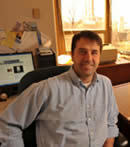
My mother hung up the phone one afternoon in 1969, sick with the news shared by a mutual friend about an old roommate from their days as Pan Am stewardesses. The woman, once so proud of her pregnancy, had flown to the Caribbean for an abortion. Mom told me recently that she took one look at her first child, my brother Tom, and wept. “I kept thinking if she’d had her baby, he would have been every bit as wonderful as Tom,” she said.
I don’t need that story to reassure me that my parents never considered an abortion when they found out about me. But I suppose they could have. I was in fact just entering the second trimester when the U.S. Supreme Court handed down Harry Blackmun’s majority opinion in the case of Roe v. Wade.
They were living in Germany at the time. Dad, building a career as a wire-service journalist, was assigned to UPI’s Bonn bureau. They’d arrived the year before in good financial shape after four life-defining years in New York, London and Moscow. But a financial crisis soon sent the dollar dropping through the floor and the high-end rent on the lease my parents had signed nearly doubled as a percentage of their income. UPI, notoriously stingy even in the best of times, made no effort to help its employees out. The company even maintained its policy of paying reporters in dollars they’d have to exchange.
The pinch was severe and my parents had to borrow money for living expenses. I’ve marveled at this story my whole life. Now, as a father of five with no skills more marketable than the ability to string sentences together, I can relate.
UPI found Dad a job in its Washington bureau and my parents made ready to move back to the United States, but their troubles were just beginning. The boy child growing in my mother’s womb had a pair of serious developmental defects detected at birth. What the German doctors thought was a relatively harmless cataract on my left eye was actually a dangerous failure of its primary vitreous to grow. A series of surgeries and eye patches and lens therapies which I endured that first year of my life saved the eye itself but left me sightless on that side.
At one point, while staying with my mother’s parents in Pittsburgh a blood vessel broke in my eye, causing me severe pain. My grandfather picked me up and soothed me as he alone had been able to do those first few months while we waited for my father to join us, but the damage to the optic nerve was permanent.
Less serious were my pigeon toes. They simply required surgeries, months of leg casts and then a pair of shoes connected with a bar I was allowed to take off for two blissful hours a day. When I finally took them off one last time in the fall of 1974, I was ready to run.
So I did. Over time, with the help of medication, cosmetic surgeries and my parents’ tireless nurturing, I learned to cope with one blind eye. Some friends don’t notice my lazy left eye until I mention it. Others admit they found it distressing at first. I still walk into doors when I’m not careful as I did just yesterday while talking to an associate vice president on my way to the elevator. I still walk into my friends if we’re going somewhere fast and I forget to position myself so they’re on my “good” side. I couldn’t hit a baseball after the pitchers started shaving and throwing 70 miles per hour. But to the satisfaction of my driving instructor and the State of Indiana, I can drive.
Still, I’m haunted. What gave my parents the courage and strength to bring me into this world amidst personal crisis and to love me through that first woeful year, when others under similar circumstances choose abortion? How many babies with defects like mine never get the chance to wear protective glasses before taking them off in high school and quitting basketball in an act of frustrated rebellion?
Why did my mother’s former roommate change her mind? And why did my mother cry? I don’t know. I’m just glad to be alive.
I have protested legal abortion since I learned about it in junior high. But I have been heartened over the years to see so many reach the conclusion that this goes even deeper than the intersection of morality and law. Whether Roe is overturned today or never, the lasting cure for abortion is the painstaking, sacrificial work of love and life, of culture and spirit. The joy my parents felt despite my cloudy eye and half-moon feet, like the joy I felt even while my own son spent his first week in that bright incubator, is available to everyone. And it’s eternal.
John Nagy is an associate editor of Notre Dame Magazine.